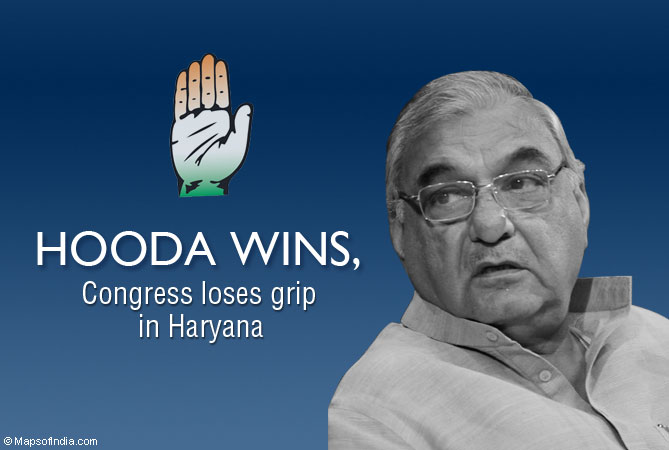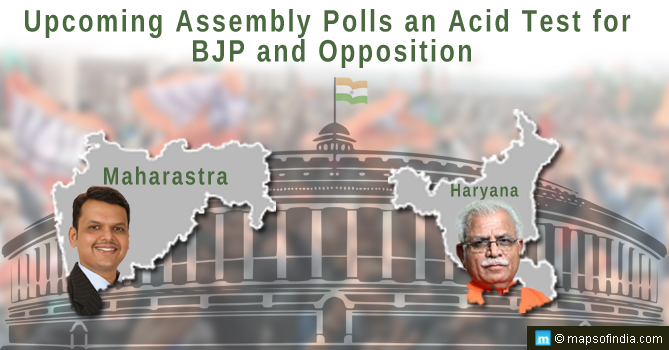This is a question Bhupinder Singh Hooda must be asking himself after vehemently reiterating that there was no anti-incumbency in the state nor was there a Modi wave. The results declared today have proved him otherwise. The Indian National Congress has been decimated after two consecutive terms in office and now, BS Hooda will have to stand up and take responsibility for the wipeout. Despite getting an individual win, his party has had to suffer a defeat with only 15 seats in hand.
Anti-incumbency is a fact that all parties in power face at some point of time and to that extent, the Hooda government is not an exception but what stands out is the margin of defeat, which only seems to reflect the people’s angst against this administration.
So what brought about this dramatic transition in people’s faith?
The second term for the Hooda administration seems to have been a replay of the UPA at the centre, where it believed that the second time vote of confidence meant that the people could be taken for granted. At the centre, the Manmohan Singh-Sonia Gandhi team governed with contemptuous nonchalance and inaction towards various scams that only resulted in people’s frustration and anger to fester.
The Lok Sabha elections should have been an eye opener for BS Hooda and should have spurred his administration into action but instead he continued to live an ostrich-like life and it remained business as usual, until of course, voting day. He now has to face the bitter truth and do some serious introspection on what went wrong for the party that did seem to have the people’s confidence, at least for some period of time through the second term.
So what were the main issues that contributed to this administration’s downfall?
Corruption
When BS Hooda led the INC to victory in 2005 Assembly elections, he won a landslide victory on the back of a promise for a clean administration and good governance, both of which were certainly not the hallmark of the Om Prakash Chautala regime that got voted out. It’s ironic that the INC is going to be voted out exactly for the same reasons and almost in the same manner i.e. a wipeout. No lessons learnt.
During Om Prakash Chautala’s regime, the people were fed up with institutionalized corruption and strong arm tactics of the regime, while the repeated number of scam exposes during the Hooda administration rule has only resulted in a loss of credibility that was built over the previous years and will be the main cause for its nemesis.
The Hooda government’s handling of the Vadra episode and the subsequent unceremonious hounding out of Ashok Khemka only added to the perception of corruption in an election year.
BS Hooda represented a freshness in the murky world of Haryana politics when he came to power for the first time. The people had hope and he did deliver on many issues, especially with reference to the previous regime but somewhere along the way he lost out to the temptations of political profit and all those around him gained. Ultimately, he became synonymous with corruption and cronyism, a taint he was unable to remove and now he has paid the ultimate price.
Lack of uniform development
With INC getting a second mandate both at the centre and state, the Hooda administration had its best opportunity to implement reforms and accelerate development uniformly across the state. Instead, the last five years has shown only selective development in certain pockets of Haryana, with little or no development in most parts.
The Hooda administration completely failed to deliver on core people problems like availability of 24-hour electricity supply and clean drinking water. Take electricity or lack of it, for instance. The administration failed to attract adequate investments in power in the state and was unable to ensure timely modernization on transmission and distribution capacity in the state. This along with poor financial management resulted in stoppage of electricity by private power suppliers to the state and what did get supplied, resulted in lop sided availability of electricity that left no segment satisfied.
Factories had to incur additional expenses in arranging their own diesel to run private generators, farmers did not get adequate supply for timely irrigation and the common man had to ride out the oppressive summer heat without electricity through most of the day and night. The result was sheer retaliation in the only way a common man can, he exercised his right to vote.
In almost all areas that touch the common man, there was little by way of development. On one hand, one could see Gurgaon racing ahead with its elitist expansion, mostly on account of private capital rather than any increased government investment, on the other, there was miserable existence with poor amenities and with no change in the lifestyle of the common man, who had no choice but to continue with his daily grind for survival.
Very little has been done in crucial areas of affordable housing, road construction and maintenance, availability of drinking water, medical infrastructure and services, upgradation of school and higher education infrastructure, and public transportation, amongst a host of pending issues.
It’s not that no work was done, the problem was that the development was restricted to a few pockets with large parts of the state remaining untouched. Governance and public administration must not only be done but be seen to be done fairly and for all. The common perception was otherwise and this has been the Hooda administration’s undoing.
Rampant conversion of agricultural land for commercial development
The Hooda administration went on a land use conversion overdrive under the garb of developing the state. The move only resulted in a few creating massive wealth while alienating the rest of the farming community, most of whom are small land holders and barely surviving. The farmers who were the main supporters of BS Hooda shifted their loyalties as they began to view Hooda as being builder friendly rather than farmer friendly, as was the case earlier.
Inadequate development of the minorities and backward classes
This is one segment that shifted its loyalties from INC to BJP. This has happened due to two factors; one is the fact that there was not much change in the quality of life for the minorities and backward classes in the state, and the second is rise of Narendra Modi, who seems to have inspired all groups and given hope that perhaps BJP could deliver where INC failed. The massive mandate for BJP has confirmed this view.
Concluding view
There is a lesson for all political parties in these elections, the biggest of which is never take the voter for granted. Today’s voter has evolved from being an uneducated, naïve, ignorant-of-his-rights kind of a person, to being highly aware of his rights and power to elect. Thanks to the media, in all its forms, today’s voter is better informed on his choices and is able to stake a claim on his rights. Gone are the days when the voter could be turned on the usual promises of vote bank politics, elections after elections.
Today’s voter expects and demands performance and that is going to be the new mantra. It’s time for





